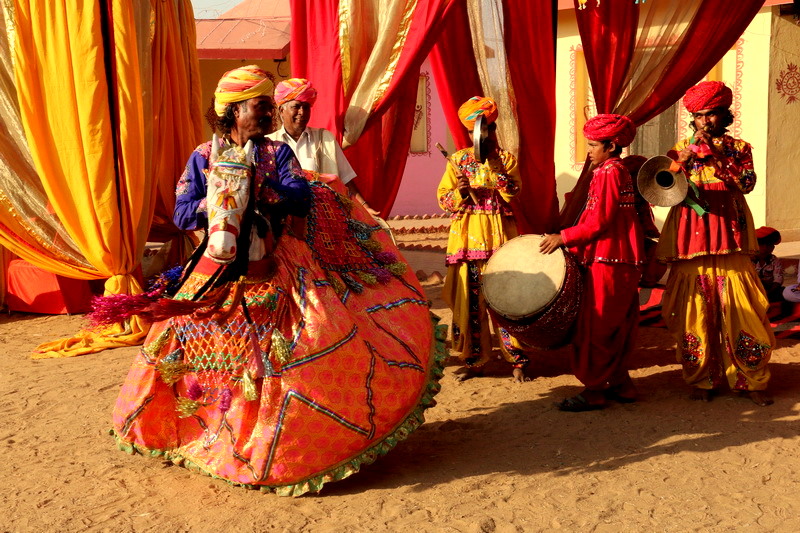Pushkar hung in my thoughts like a dream. After having seen several of my plans for Pushkar get cancelled, this time I tried some serious nudging on myself; to be there at the sacred moment of Pushkar camel fair. The very idea of camels and traders journeying across the vast deserts of Rajasthan in a time immemorial fashion to meet, socialize, and trade, found an inkling in me. Pushkar is a complete teleportation from the urbane life to a rustic one, from economy that survives on cars to one where camels form an integral part. The romantic image of camels loping across the desert in Rajasthan, enthused me to plan the plan I had waited for so long.
Pushkar has a magnetism of its own – it’s very unlike the way one imagines Rajasthan. Fair or not, it will never cease to sweep you off your feet. The town celebrates the riddles of life, throughout the year. Pushkar made me rejig the concept of time; moments into Pushkar and a feeling that everything has been stalled, got me. The antiquity of the town is inspiring. The everyday world of Pushkar does more than inspire and encourage well-being, it makes the sordid routine seem novel.

Pushkar Ghat
I was in Pushkar, at the annual camel fair, indisputably, the best time of the year to be in. Everywhere I turned, I could hear music, see a riot of colours, feel the exuberance of the fair and sense Pushkar’s ability to engage with tourists pouring from world over; and then there was the rustic hue, atmospheric shots of herders and their camels, trekking past the deserts. Calling the Pushkar fair just magnetic, would be an understatement. It is far more than that, it takes you out of your cocoon, into a world unknown and untraversed. One eyeful of Pushkar, and the reason that made it a favorite among foreign tourists, becomes discernible. Pushkar is everything most Indian cities are not; it’s sleepy, calm, inviting and engaging; a tell-tale of a town that has thrown off its provinciality.

Hot air baloon is a new addition in Pushkar Fair
Pushkar Fair
In the autumn, as the moon starts its journey for the brightest night of the year, tribes from all over Rajasthan, stream out of their ethnic lands, arid landscapes, stubbly fields, thickets, scrubs, and deserts; trudging with their beasts, draped in multi-colored turbans, travelling with rivulets of kaleidoscopic caravans. The women of the tribes, come draped in their gypsy bright skirts swaying in autumn winds like daffodils, sporting bright silver and bronze jewelry rivaling the smoldering sun and big, arresting bindi on forehead; engrossed in little chats. And at certain distance are scattered groups of travelers, some from different corners of the country and more from abroad, lost in the little riddles and proses of this town.
Pushkair fair brings them all together.



Pushkar, the Brahma’s land
Pushkar, is a legendary town, stretched around the three sacred lakes, and legends say Lord Brahma, the Creator of the Hindu Trinity, while flying over this land, had dropped three petals from the lotus he carried. The three petals became the three lakes of Pushkar. Some say the creator landed on this auspicious land and performed a holy ritual. Others take the tale a little further and claim that Lord Brahma married a tribal girl in Pushkar. Ever since, people gather in thousands, at this holy place to bathe and worship on the anniversary of the Creator’s sacrifice.
Regardless of legendary tales, Pushkar has grown, both as a colourful animal fair and an international tourist destination. While traders throng here to trade cattle, sheep, camels and thoroughbred horses; for tourists, it’s an escape from their world with an added flavor of good deal of craft shopping and café hopping.
A colony of backpackers
The moment our car breast the hill, magic unfolded. It was early morning, wind carried the chill of the night and the sun was in a sleepy state. In the distance the three lakes glinted like jewels, and a little further, through dust and haze, campfires twinkled. We maneuvered our way through the narrow alleys, the morning markets, the hubbub of a touristy town, making our way towards the hotel. And as we drove, a part of us mingled with the razzmatazz of the place. It seemed like a shifting kaleidoscope of emotions, trying to find a balance somewhere between the serenity of the place and the ordered chaos of the fair. The central area of the fair was crowded with visitors thronging the shops and eateries, while the herders and traders took the plains, focusing on their business.
The colonization of backpackers have made this a model town: a place created by and for the tourists, with multicuisine eateries, chic cafes, schools of yoga, massage, Indian music and dance, shops selling herbal cosmetics, perfumes and the inexplicable clothing that characterizes the backpacker diaspora. And it’s all there, shops feasting with colourful textiles, silver jewelry and crafts, town lost in backpacker’s thoughtless party reverie, locals engrossed in their daily chores playfully mixed with spiritual detours, houses with open courtyards with murals to keep you on a click frenzy mode, nomads exhibiting their ravishing dreadlocks and loincloths, and a gastronomic culture that has evolved due to mixing of myriad of cultures and aspirations. The rooftops of medieval buildings with exquisite jharokhas have been turned into cafes, offering new vignettes of the lake with its ghats, the sprawl of temples and the town around the sacred lake. Some ancient courtyards have been turned into meditation centers. It’s suggested to keep enough time on hand to pencil in such moments, after all everything in Pushkar moves at its own leisurely pace. From temple to temple, take your time to discover the cultural and spiritual nuances of the place.
I often ditched the fair to be by the lake, often joined by a group of backpackers with their musical instruments. These are not rare moments, this is routine in Pushkar. And be it any moment, there’s always a spirit of gay abandon, hanging in Pushkar.

Pushkar has evolved as an offbeat and ethnic shoppers paradise
The divine in Pushkar
In the evenings, as the sun slips into the valleys, the lake comes alive with the flickering of the lamps during the scenic aarti. The Pushkar fair ends on a full moon night, and thankfully, I was there, to bear witness to his heavenly spectacle. The ambience with lights twinkling in the twilight was ethereal. Drumbeats, clash of symbols and chiming of bells herald the aarti on the final day i.e. on Purnima (full moon). Lamps are lit and placed all-round the Ghat. This was probably the first time, I was coming in terms with the spirituality of Pushkar. I had seen its jamboree, its gay abandon, the way it has engaged with all cultures and left a part of it in them, and the way it has shaped itself to be a hot tourist destination, but this was different. This was Pushkar, the way it has been for all these centuries, when the travellers had not arrived and it still carries that air.
What else to do
Apart from all the spiritual, culinary, musical, and shopping adventure, you can hire a bike and go to Ratnagiri Hill for sublime sunset views over the lake. Do a one-and-a-half-hour hike up to Savitri Devi Temple. Most times of the year, the skies are fabulous canvasses of delight.

Indian Ocean band performing in Pushkar Fair
Hits: 289
Tags: Backpackers, Backpacking in India, best backpacker places in India, Ethnic shopping in Pushkar, Forts in Rajasthan, Offbeat Rajasthan, Pushkar, Pushkar camel fair, Pushkar Fair, Rajasthan tourism, Yoga classes in India Last modified: December 31, 2017






Lovely post! Pushkar has been high on my list for a long time. I don’t know when I’ll get a chance to go there.
M sure very soon …
[…] via Pushkar: kaleidoscope of emotions — Hand of Colors […]
[…] via Pushkar: kaleidoscope of emotions — Hand of Colors […]
I have been to Pushkar once, but not during the camel fair. I loved its vibe and colours. But yes, I’d like to witness the camel fair, too and take lots of photos.
I have been twice – one during fair and one in Feb…it was equally enchanting in Feb
I visited Pushkar where the peaceful environment provided the deep inner peace to my mind, body and soul. I enjoyed the camel ride and got a chance to witness the various fun filled activities during the Pushkar Fair. One should not miss a chance to visit Pushkar during their trip to Rajasthan or India. Lovely and amazing post by the author.
I completely agree. Pushkar is medicative
I agree with your point of view, your article has given me a lot of help and benefited me a lot. Thanks. Hope you continue to write such excellent articles.